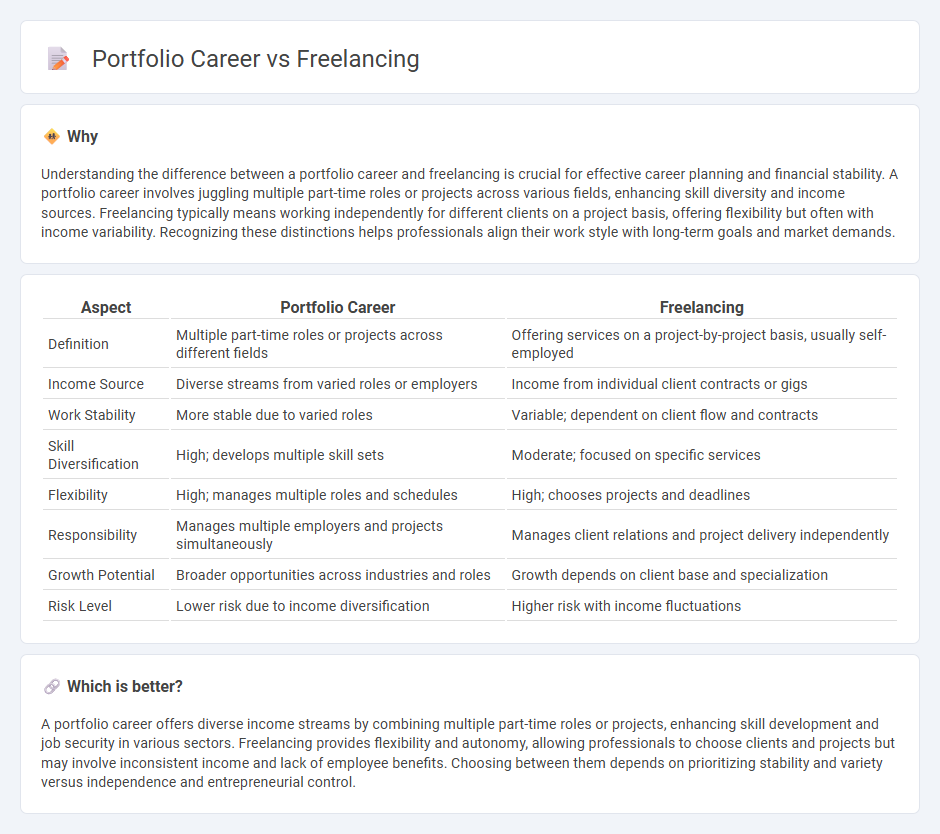
A portfolio career combines multiple part-time roles, freelance projects, and self-employment ventures, offering diversified income streams and skill development. Freelancing focuses on providing specialized services independently to various clients, often with flexible schedules but varying workload stability. Explore the nuances of portfolio careers and freelancing to determine the best fit for your professional goals.
Why it is important
Understanding the difference between a portfolio career and freelancing is crucial for effective career planning and financial stability. A portfolio career involves juggling multiple part-time roles or projects across various fields, enhancing skill diversity and income sources. Freelancing typically means working independently for different clients on a project basis, offering flexibility but often with income variability. Recognizing these distinctions helps professionals align their work style with long-term goals and market demands.
Comparison Table
| Aspect | Portfolio Career | Freelancing |
|---|---|---|
| Definition | Multiple part-time roles or projects across different fields | Offering services on a project-by-project basis, usually self-employed |
| Income Source | Diverse streams from varied roles or employers | Income from individual client contracts or gigs |
| Work Stability | More stable due to varied roles | Variable; dependent on client flow and contracts |
| Skill Diversification | High; develops multiple skill sets | Moderate; focused on specific services |
| Flexibility | High; manages multiple roles and schedules | High; chooses projects and deadlines |
| Responsibility | Manages multiple employers and projects simultaneously | Manages client relations and project delivery independently |
| Growth Potential | Broader opportunities across industries and roles | Growth depends on client base and specialization |
| Risk Level | Lower risk due to income diversification | Higher risk with income fluctuations |
Which is better?
A portfolio career offers diverse income streams by combining multiple part-time roles or projects, enhancing skill development and job security in various sectors. Freelancing provides flexibility and autonomy, allowing professionals to choose clients and projects but may involve inconsistent income and lack of employee benefits. Choosing between them depends on prioritizing stability and variety versus independence and entrepreneurial control.
Connection
Portfolio careers and freelancing are connected through their emphasis on diversified income streams and flexible work arrangements, allowing individuals to manage multiple projects or roles simultaneously. Both approaches leverage specialized skills across different industries, enhancing professional resilience and adaptability in a dynamic labor market. This connection supports the growing trend toward self-employment and gig economy participation, driven by technological advancements and changing workforce preferences.
Key Terms
Autonomy
Freelancing offers autonomy through project-based work, allowing individuals to choose clients and set schedules with flexible control over their tasks. A portfolio career integrates multiple income streams and roles, providing broader autonomy by combining diverse skills and interests in a self-directed manner. Explore how autonomy shapes freelancing and portfolio careers to determine which path aligns with your professional freedom goals.
Income diversification
Income diversification in freelancing offers variable project-based earnings, dependent on client demand and skill specialization. Portfolio careers combine multiple income streams from different roles or businesses, enhancing financial stability and reducing risk. Explore how diversifying income through these approaches can secure your financial future.
Skill variety
Freelancing offers flexibility to work on diverse projects, providing constant opportunities to develop multiple skills across industries. A portfolio career combines various roles or jobs, enhancing skill variety by integrating expertise from different fields into one cohesive professional identity. Explore how skill variety in freelancing and portfolio careers can elevate your career path.
Source and External Links
Freelancing 101: What is Freelancing? - GCF Global - Freelancing is a form of self-employment where you work independently for various clients, enjoying freedom on when, where, and for whom you work, often enabled by the internet and diverse skills.
What Is Freelancing? Basics and Popular Jobs in 2025 - Upwork - Freelancing involves doing specific work for clients without full-time employment, with key steps to start including choosing a niche, building a portfolio, setting rates, promoting services, and managing communication and taxes.
25 best freelance websites to find work in 2025 - Hostinger - Freelancing offers flexibility in choosing projects and clients, with benefits including flexible work hours and professional growth, and beginners can start part-time while building skills and reputation via freelance platforms.
 dowidth.com
dowidth.com